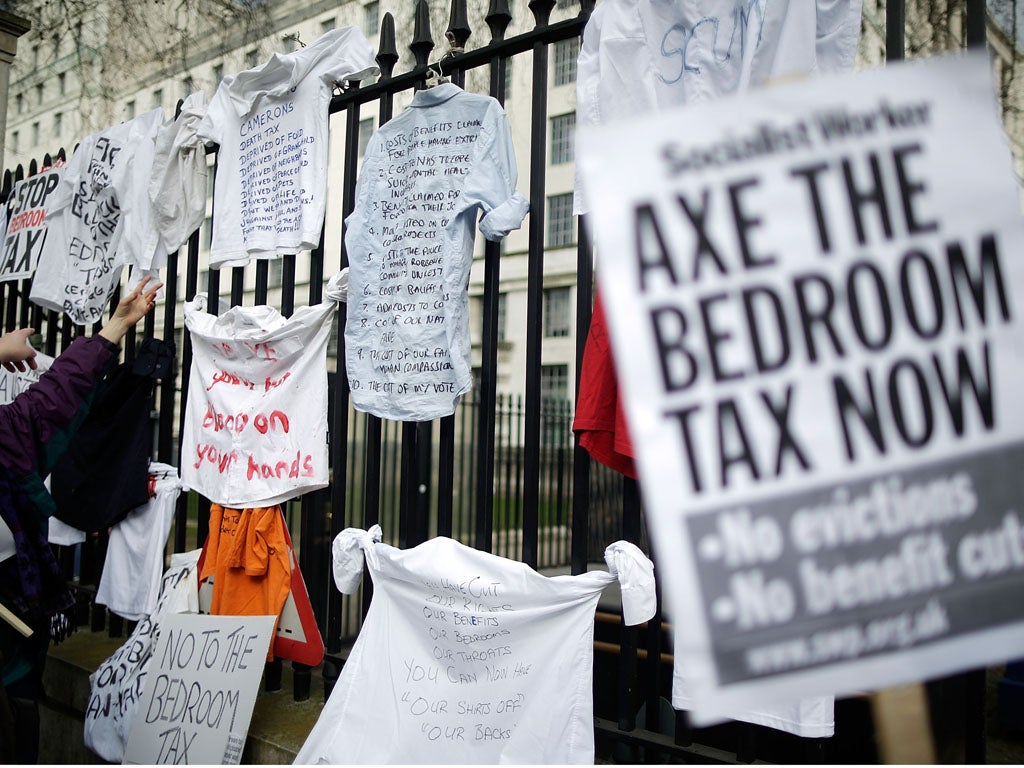All we can agree on is that welfare’s in a state
Our complex, wasteful system benefits the rich while the needy are left to struggle with bureaucracy


Your support helps us to tell the story
From reproductive rights to climate change to Big Tech, The Independent is on the ground when the story is developing. Whether it's investigating the financials of Elon Musk's pro-Trump PAC or producing our latest documentary, 'The A Word', which shines a light on the American women fighting for reproductive rights, we know how important it is to parse out the facts from the messaging.
At such a critical moment in US history, we need reporters on the ground. Your donation allows us to keep sending journalists to speak to both sides of the story.
The Independent is trusted by Americans across the entire political spectrum. And unlike many other quality news outlets, we choose not to lock Americans out of our reporting and analysis with paywalls. We believe quality journalism should be available to everyone, paid for by those who can afford it.
Your support makes all the difference.What a strange world we live in.
A clutch of Church leaders spent their holiest weekend of the year queuing up to attack the Government for its flint-hearted approach to the poor. Meanwhile, the Prime Minister used his Easter message to proclaim his joy that our hard-pressed nation is giving away 0.7 per cent of its national income in overseas aid.
Few things better demonstrate the peculiar shape of modern British politics. Despite the debt crisis, the Government is applauded by the great and good for encouraging welfare dependency across the globe with anachronistic and profligate aid policies – while at home it is making tentative steps to end such a dependency culture, and coming under withering fire from critics who claim to care about the poorest in society.
Rationalism and reality are rarely allowed to intrude into the emotionally charged debate over welfare. As a raft of reforms came into force yesterday, there were shrill screams of outrage on the left that the poor were being sacrificed, the health service dismembered and the country condemned into Hogarthian dystopia. At the same time, some on the right smacked their lips at the prospect of slashing back the welfare state faster and deeper, despite the biggest contraction since its foundation six decades ago.
The Coalition deserves some credit for seeking to tackle a bloated and unaffordable system – although it is unfortunate that these reforms came into play in the same week as its stupidest policy, of cutting income tax for the super-rich. Britain is far from alone in Europe in wrestling with these issues; the need for action will only grow in time. It is worth remembering that the Blair government came into office declaring the need to save the welfare state and think the unthinkable, only to bottle it on all but the most cosmetic changes.
Labour ended up flooding the country with taxpayers’ cash, much of it landing in the wrong pockets – just as in the aid industry. Doctors, consultancy firms, local authority officials, private landlords and a plague of self-appointed experts did well, while five million working-age Britons were left to rot on benefits, a soul-sapping existence far removed from the dominant “strivers versus shirkers” narrative. When 878,300 people on incapacity benefit decide not to even submit to new tests to determine if they can work, something has clearly gone astray, however flawed the testing process.
Again as in the aid world, policies introduced with good intentions have backfired with disastrous outcomes. To take one example from many, who was helped when the cost of housing benefits doubled over the past decade to £23bn? Certainly not the poor, often stuck in grossly sub-standard homes. And does it really help Britain to spend as much on this single benefit as on all the subsidies for our transport system?
But the same is true of reform – the wrong moves can make matters worse. This is why disabled people are so scared over the scrapping of Disability Living Allowance. Ministers have declared their intention to cut one-fifth off the £13bn bill, yet already half of claimants are turned down for a benefit that plays a crucial role in helping people to work and participate in society. As with the ridiculous “bedroom tax”, there is good cause for concern.
But instead of harking back to a mythical golden age, those who care about protecting the poor and helping people play their rightful role in society should shout loudest for change. Money is a key part of the equation – but it is not the only part. We evolved a complex, wasteful welfare system that often benefits the better-off and the providers of services, while those in need are left to struggle through a blizzard of bureaucracy, only to end up with peanuts when they emerge blinking into the light.
This is one reason it is wrong to continue handing out bus passes and television licences to wealthy old people. Some half of all welfare spending goes to pensioners, something often lost amid the frenzy of this debate.
It is nonsensical to continue giving these perks to everyone, however rich, when disabled people are having vital support slashed. We simply cannot afford to keep on pandering to the electoral power of pensioners, nor to remain in thrall to the outdated concept of universal benefits.
All too often, of course, the welfare system is blamed for problems elsewhere. One reason for the soaring cost of housing benefits is the grotesque failure of successive governments to ensure enough homes were built in Britain. And the spiralling cost of disability benefits is partly down to lingering prejudice that makes it hard for people with disabilities to use public transport or obtain employment; even before the downturn, fewer than half had jobs compared with more than three-quarters of other working-age people.
Voters recognise that the welfare system has gone astray, which is why there is firm backing for policies such as the benefit cap and Labour is in such a pickle on these issues. Such support may wilt, however, as subsequent rounds of reform bite deeper: child benefit proved how people endorse cuts until they change from abstract headlines into reality in their own homes.
Amid the sound and fury of this week, the harsh truth is that we have only begun the battle to remould the welfare state. If we fail to get it right, we will all be the losers.
Twitter: @ianbirrell
Join our commenting forum
Join thought-provoking conversations, follow other Independent readers and see their replies
Comments